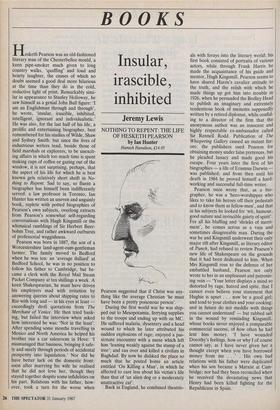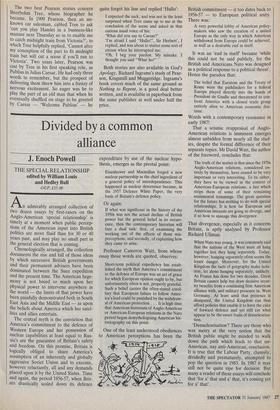BOOKS
Insular, irascible, inhibited
Jeremy Lewis
NOTHING TO REPENT: THE LIFE OF HESKETH PEARSON by Ian Hunter Hesketh Pearson was an old-fashioned literary man of the Chesterbelloc mould, a keen pipe-smoker much given to long country walks, 'quaffing' and loud and hearty laughter, the causes of which no doubt seemed a good deal more hilarious at the time than they do in the cold, reductive light of print. Remarkably simi- lar in appearance to Stanley Holloway, he saw himself as a genial John Bull figure: 'I am an Englishman through and through', he wrote, 'insular, irascible, inhibited, intelligent, ignorant and individualistic.' He was also, for the last half of his life, a prolific and entertaining biographer, best remembered for his studies of Wilde, Shaw and Sydney Smith: but since the lives of industrious writers tend, beside those of field marshals or explorers, to be unexcit- ing affairs in which too much time is spent making cups of coffee or gazing out of the window, it is not surprising, perhaps, that the aspect of his life for which he is best known gets relatively short shrift in No- thing to Repent. Sad to say, so fluent a biographer has himself been indifferently served: a law professor in Toronto, Ian Hunter has written an uneven and ungainly book, replete with potted biographies of Pearson's own subjects, overlong extracts from Pearson's somewhat self-regarding conversations with Hugh Kingsmill or the whimsical ramblings of Sir Herbert Beer- bohm Tree, and rather awkward outbursts of professorial waggishness.
Pearson was born in 1887, the son of a Worcestershire land-agent-cum-gentleman farmer. The family moved to Bedford when he was ten: an 'average dullard' at Bedford School, he was in no position to follow his father to Cambridge, but be- came a clerk with the Royal Mail Steam Packet Company at ten shillings a week. A keen Shakespearian, he must have driven his employers mad with irritation by answering queries about shipping rates to Rio with long and — in his eyes at least exceedingly droll quotations from The Merchant of Venice. He then tried bank- ing, but failed the interview when asked how interested he was: 'Not in the least'. After spending some months travelling in Mexico and North America he helped his brother run a car salesroom in Hove: 'I mismanaged that business, bringing it safe- ly and surely through periods of accidental prosperity into liquidation.' Nor did he have better luck on the domestic front: soon after marrying his wife he realised that he did not love her, though they stayed together despite some infidelities on his part. Relations with his father, how- ever, took a turn for the worse when
Hamish Hamilton, f14.95 Pearson suggested that if Christ was any- thing like the average Christian 'he must have been a pretty poisonous person'.
During the first world war he was ship- ped out to Mesopotamia, ferrying supplies to the troops and ending up with an MC. He suffered malaria, dysentery and a head wound to which he later attributed his sudden explosions of rage; enjoyed a pas- sionate encounter with a nurse which left him 'leaning weakly against the stump of a tree'; and ran over and killed a civilian in Baghdad. By now he disliked the place so much that he posted home an article entitled 'On Killing a Man', in which he affected to care less about his victim's life than that of 'an alien dog or a moderately unattractive cat'.
Back in England, he combined theatric- als with forays into the literary world: his first book consisted of portraits of various actors, while through Frank Harris he made the acquaintance of his guide and mentor, Hugh Kingsmill. Pearson seems to have shared Harris's cavalier attitude to the truth, and the relish with which he made things up got him into trouble in 1926, when he persuaded the Bodley Head to publish an imaginary and extremely tendentious book of memoirs supposedly written by a retired diplomat, while confid- ing to a director of the firm that the anonymous author was an innocent and highly respectable ex-ambassador called Sir Rennell Rodd. Publication of The Whispering Gallery caused an instant fur- ore: the publishers sued Pearson for obtaining money under false pretences, but he pleaded lunacy and made good his escape. Four years later the first of his biographies — a life of Erasmus Darwin was published; and from then until his death in 1964 he proved himself a hard- working and successful full-time writer.
Pearson once wrote that, as a bio- grapher, he was a 'hero-worshipper who likes to take his heroes off their pedestals and to know them as fellow-men', and that in his subjects he looked for 'wit, humour, good nature and invincible gaiety of spirit'. For all his bluffing and 'shrieks of merri- ment', he comes across as a vain and sometimes disagreeable man. During the war he and Kingsmill underwent their only major rift after Kingsmill, as literary editor of Punch, had refused to review Pearson's new life of Shakespeare on the grounds that it had been dedicated to him. When Mrs Kingsmill rose to the defence of her embattled husband, Pearson not only wrote to her in an unpleasant and patronis- ing vein — 'Your letter displays a mind so distorted by rage, hatred and spite, that I cannot even believe your statement that Hughie is upset . . . now be a good girl; and tend to your clothes and your cooking; and in future do not meddle with things you cannot understand' — but rubbed salt in the wound by reminding Kingsmill, whose books never enjoyed a comparable commercial success, of how often he had lent him money. 'I have wounded Dorothy's feelings, how or why I of course cannot say, as I have never given her a thought except when you have borrowed money from me . . . His own bad relations with his father were duplicated when his son became a Marxist at Cam- bridge; nor had they been reconciled when he received the devastating news that Henry had been killed fighting for the Republicans in Spain. The two best Pearson stories concern Beerbohdi Tree, whose biographer he became. In 1909 Pearson, then an un- known car salesman, cabled Tree to ask `can you play Hamlet in a business-like manner next Thursday so as to enable me to catch midnight train from Victoria?'; to which Tree helpfully replied, 'Cannot alter my conception of the part to fit midnight train but will cut a scene if you'll run to Victoria'. Two years later, Pearson was cast by Tree in his first speaking role, as Publius in Julius Caesar. He had only three words to remember, but the prospect of delivering them threw him into a frenzy of nervous excitement. So eager was he to play the part of an old man that when he eventually shuffled on stage to be greeted by Caesar — 'Welcome Publius' — he quite forgot his line and replied 'Hullo': I expected the sack, and was not in the least surprised when Tree came up to me at the conclusion of the scene and asked in that curious nasal voice of his:
'What did you say to Caesar?'
`I'm afraid I said "Hullo!", Sir Herbert', I replied, and was about to stutter some sort of excuse when he interrupted me: `Oh. I beg your pardon. My mistake. I thought you said "What ho!" '
Both stories are also available in God's Apology, Richard Ingrams's study of Pear- son, Kingsmill and Muggeridge. Ingrams's book covers much of the same ground as Nothing to Repent, is a good deal better written, and is available in paperback from the same publisher at well under half the price.




































 Previous page
Previous page